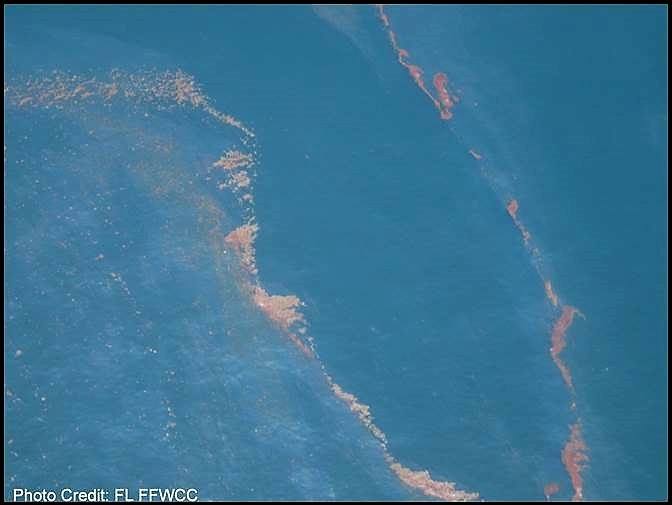Adding Insult to Injury: More Offshore Drilling, Less Oversight | Dive Into Democracy
By: Larissa Liebmann

Not only is the Trump Administration proposing to massively increase the offshore areas open to oil and gas drilling, it also wants to let drilling companies skimp on safety measures. The Bureau of Safety and Environmental Enforcement (BSEE) has proposed changing regulations enacted in response to BP’s Deepwater Horizon disaster, the largest oil spill in U.S. history.
Andrew Hayslip, executive director of Tampa Bay Waterkeeper, was a direct responder to the BP oil spill when he worked for the Florida Fish and Wildlife Conservation Commission (FWC) in their Center for Spatial Analysis. He saw firsthand the impacts that irresponsible offshore drilling had on our wildlife, environment, human health, and economy:
“I spent three months at Incident Command posts in St. Petersburg and Miami. My colleagues and I were in the office nearly every day around 3 a.m. to create the surface oiling maps that were used throughout the Gulf to aid in response efforts. I watched, alongside the rest of America, and particularly those folks whose livelihoods relied on a healthy Gulf, as the surface oiling spread from the Macondo well site and threatened local beaches, fisheries, and businesses. I remember the very real fear we all felt over the significant threat that the oil would find its way to the Gulf Stream, which would carry it around the coast of Florida and along the Atlantic coasts of Florida, Georgia, and South Carolina. During the 87 days that oil flowed freely from the site of the spill, there was a feeling of helplessness as we realized the full extent of the impacts and risks.”
Following this unforgettable disaster, new safety requirements were established to prevent accidents like the BP spill from ever happening again. However, drilling companies complained that these rules are too costly and stop them from pursuing offshore drilling. In response, BSEE, directed by the Trump Administration, is now proposing to amend these safety measures to save offshore drilling companies money. While the companies benefit, the public will be left with less protection, increasing the chances of serious offshore drilling accidents. One of the biggest changes being proposed would allow the industry’s own inspectors to certify that pollution prevention and safety equipment is working, rather than independent inspectors.
Is it really possible that we have forgotten the lessons of the Deepwater Horizon spill in fewer than eight years? Offshore drilling can never be made one hundred percent safe. It always carries the risk of devastating spills and leaks and will increase greenhouse gas emissions. But, it is insult on top of injury for the Trump Administration to propose allowing offshore drilling off of nearly every U.S. coast, and at the same time propose that offshore drilling companies should have less stringent safety requirements.
This week, we are asking you to stand up against the Trump Administration’s attempts to save oil and gas companies money while putting our oceans and coastal communities in greater danger. Please submit a comment explaining why you think this revision is a bad idea. The comment period ends on January 29, 2018, and we have created a template to get you started:
“I am writing to object to this proposal to revise safety regulations for offshore drilling. These safety regulations were created in response to a devastating disaster — BP’s Deepwater Horizon oil spill. This oil spill has had lasting impacts on the Gulf of Mexico and the communities that rely on the Gulf. These safety regulations, while not enough to stop all offshore drilling accidents, were an important step forward to require drilling companies to take appropriate precautions and hold them accountable for their actions
Since the BP oil spill, offshore drilling companies have given no indication that they are more responsible or should be trusted to prevent disasters. The motivation to revise these safety rules is based purely on industry not wanting to bear the cost of operating as safely as they can and should. An industry with such a poor track record does not deserve a break when it comes to safety requirements.
This proposal is even more troubling in light of the efforts by the Administration to vastly expand areas open to offshore drilling. Not only are coastal communities around the United States facing the possibility of expanded offshore drilling threatening their livelihood, they also are facing the possibility of an industry operating with weakened safety standards.
Offshore drilling can never be made one hundred percent safe. To suggest that safety requirements should be dialed back to make offshore drilling more profitable is absurd and an insult to millions that rely on our coasts and care about our oceans. Therefore, I am asking the Bureau of Safety and Environmental Enforcement to reconsider its revisions to these rules.”
As always, your comments will be much more impactful if you include personal and factual details.
Feature image by Florida Fish and Wildlife Conservation Commission (FWC)